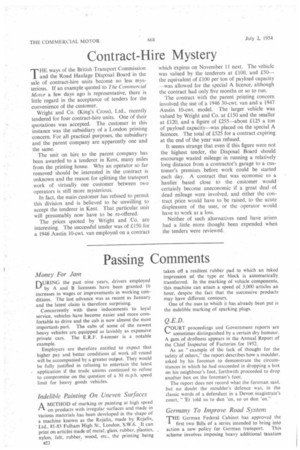Contract-Hire Mystery
Page 48

If you've noticed an error in this article please click here to report it so we can fix it.
THE ways of the British Transport Commission and the Road Haulage Disposal Board in the sale of contract-hire units become no less mysterious. If an example quoted to The Commercial Motor a few days ago is representative, there is little regard in the acceptance of tenders for the convenience of the customer.
Wright and Co. (King's Cross), Ltd., recently tendered for four contract-hire units. One of their quotations was accepted. The customer in this instance was the subsidiary of a London printing concern. For all practical purposes, the subsidiary and the parent company are apparently one and the same.
The unit on hire to the parent company has been awarded to a tenderer in Kent, many miles from the printing house. Why an operator so far removed should be interested in the contract is unknown and the reason for splitting the transport work of virtually one customer between two operators is still more mysterious.
In fact, the main customer has refused to permit this division and is believed to be unwilling to accept the tenderer in Kent. That particular unit will presumably now have to be re-offered.
The prices quoted by Wright and Co. are interesting. The successful tender was of £150 for a 1946 Austin 10-cwt. van employed on a contract which expires on November 11 next. The vehicle was valued by the tenderers at £100, and £50— the equivalent of £100 per ton of payload capacity —was allowed for the special A licence, although the contract had only five months or so to run.
The contract with the parent printing concern involved the use of a 1946 30-cwt. van and a 1947 Austin 10-cwt. model. The larger vehicle was valued by Wright and Co. at £150 and the smaller at £120, and a figure of £255—about £125 a ton of payload capacity—was placed on the special A licences. The total of £525 for a contract expiring at the end of the year was refused.
It seems strange that even if this figure were not the highest tender, the Disposal Board should encourage wasted mileage in running a relatively long distance from a contractor's garage to a customer's premises before work could be started each day. A contract that was economic to a haulier based close to the customer would certainly become uneconomic if a great deal of dead mileage were involved, and either the contract price would have to be raised, to the acute displeasure of the user, or the operator would have to work at a loss.
Neither of such alternatives need have arisen had a little more thought been expended when the tenders were reviewed.








































































































































